A success-guaranteed panettone bread recipe that I've been making for years without fail. Imagine a tall, buttery, and fluffy brioche with candied fruits and almonds, with amazing citrusy smell. It's perfect for Christmas and the holidays!
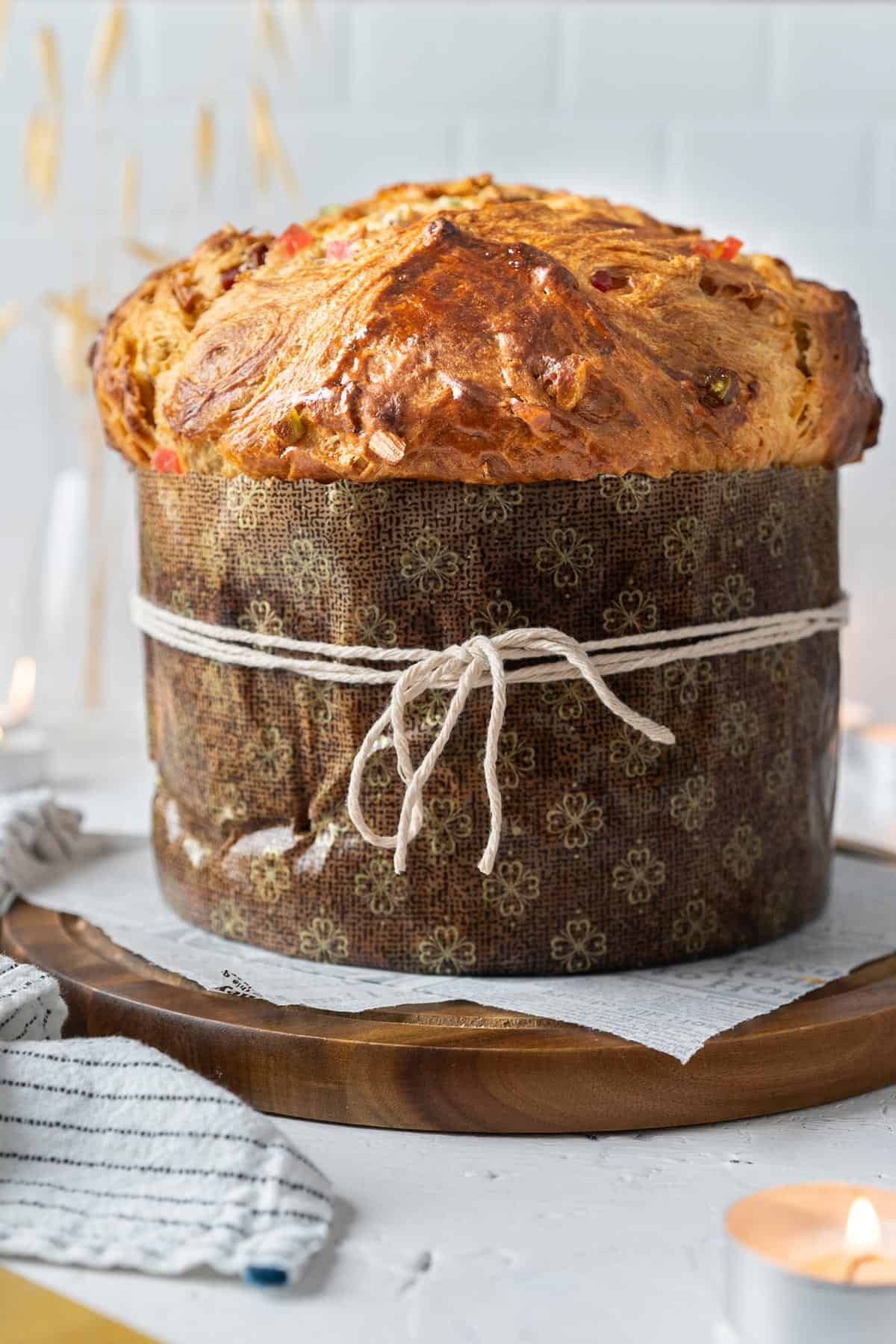
Jump to:
- What Is Panettone?
- Why This Recipe Works
- Ingredients For This Recipe
- Timeline For This Recipe
- Step-By-Step Instructions
- Recipe Expert Tips For Making Perfect Panettone
- How To Prevent Panettone From Collapsing
- How To Serve, Store, And Freeze
- Recipe FAQs
- More Holidays Recipes
- Watch How To Make It
- 📖 Recipe
- 💬 Comments
What Is Panettone?
This sweet bread is originally from Italy and is usually made for Christmas or New Year in countries like the USA, Australia, and Canada. It's also widely common throughout Europe.
The word panettone came from the Italian "panetto", which means a small loaf of bread. Since it's nothing of small size, the word was adjusted by adding "one" at the end of it, which accurately means a large bread. Some even refer to it as panettone cake.
Panettone bread is known for its tall-domed shape and its light, buttery, and fluffy texture. The process involves proofing the dough 3 times to achieve its signature characteristics. Over the years there've been varieties of shapes and flavors of panettone but the classic one like what I'm showing you today remains the favorite.
Why This Recipe Works
I've been making this homemade panettone recipe for more than 10 years. I make it every year for Christmas and everybody loves it. Here's why this is the best panettone recipe ever (heavily biased, I know)!
Easier than it looks - Don't be intimidated to make panettone bread at home. It's not as difficult as you think. I've put together all the tips and tricks that I've gathered all these years so that you don't get overwhelmed. Enjoy the process, it's so satisfying, fun, and rewarding at the end!
Soft and fluffy panettone - You'll get a tall, soft, and fluffy panettone bread that's rich, buttery, and with the perfect sweetness. There's nothing better!
Success-guaranteed recipe - I want you to be able to make this panettone bread recipe and enjoy it with your loved ones. That's why I've written in detail all the tips and tricks that I've been developing over the years so that you can make this panettone bread recipe successfully on the first try.
If I still can't convince you to give this easy panettone recipe a try, perhaps you'd want to make a mini-sized panettone? My mini chocolate panettone is so delicious and easier to make.
I have more recipes for the holidays like Marco's family easy fruitcake, mini yule log cakes, and also this irresistible nuts-free snowball cookies!
Ingredients For This Recipe
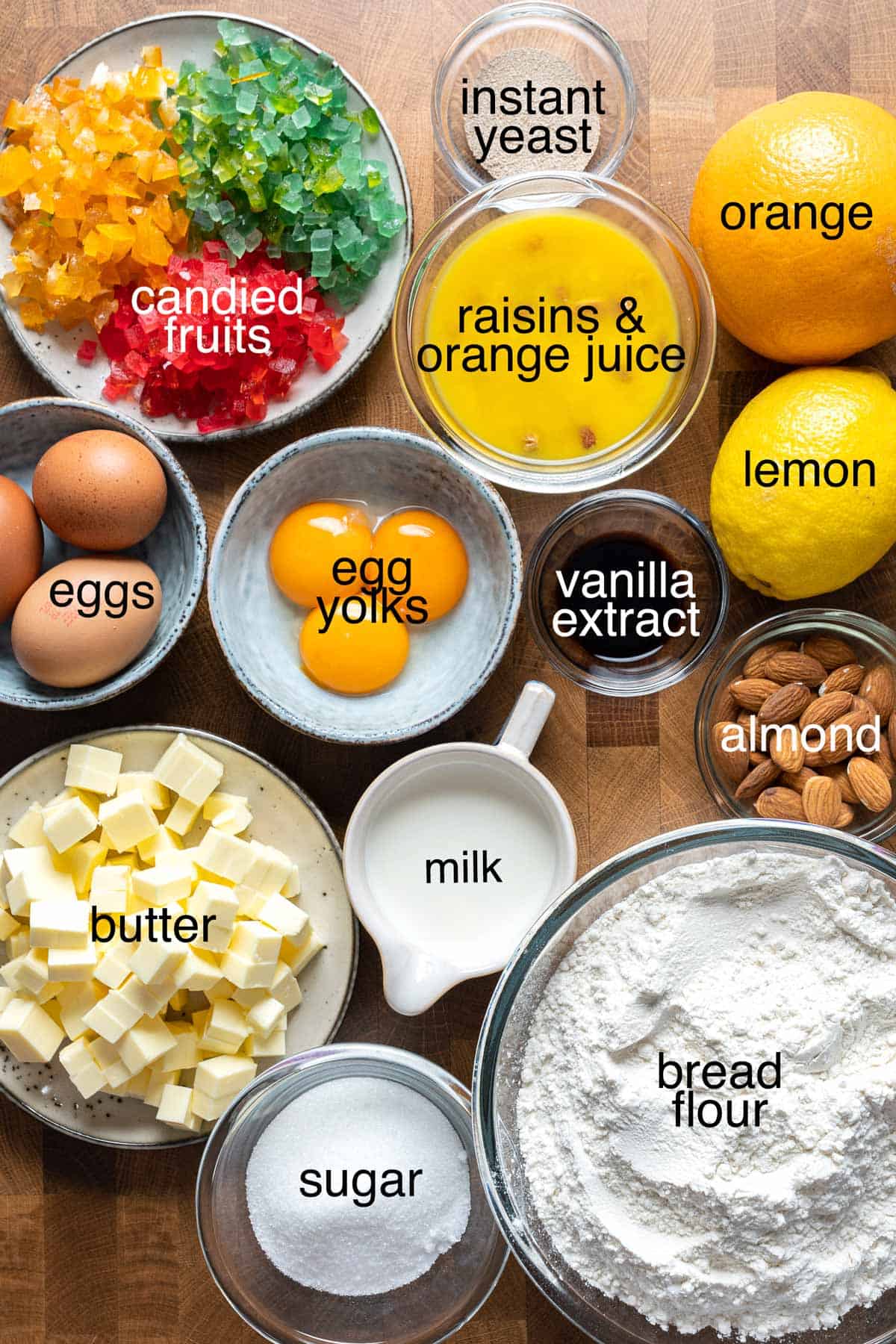
Bread flour - With 12g-13g protein/100g. A must in this panettone bread recipe. It's also known as high-protein flour. It's the key to developing gluten so you'll get soft, fluffy, good-structured panettone bread.
Citrus - I love the combo of orange and lemon zest. Even the raw dough smells amazing. My whole orange blender cake and olive orange cake are for you if you love oranges. Clementine works also for this panettone bread recipe.
White sugar - I choose good old granulated white sugar for this panettone bread recipe so that it doesn't affect the panettone bread's color if I were to use brown sugar, for example.
Candied fruits and raisins - Dried candied fruits, not the ones in jars that come in syrup. I use orange peel, cherries, and plums. You can also swap these for variations of nuts like almonds, pecans, walnuts, etc.
Orange juice - To soak the raisins and also infuse the dough.
Almonds - Any nuts will do, preferably toasted for better flavor. They give a nice contrast texture.
Yeast - I love instant dry yeast in this panettone bread recipe because it's easier to use, just add it together with other ingredients without having to activate it with water first, just like I use it in my amazing Lebanese flatbreads (Man'oushe za'atar). Use 4 ½ teaspoon (14g) of active dry yeast or 36g of fresh yeast. For both active dry yeast and fresh yeast, activate them with the warm milk before adding the mixture with the other ingredients.
⭐ See the recipe card for full information on ingredients and quantities.
Timeline For This Recipe
I'm sharing with you how to make panettone at home as I've been doing it all these years. I highly recommend you follow these so you can make it successfully with no hassles.
- Plan ahead - A panettone bread recipe involves hours but with lots of waiting time. This panettone bread recipe comes with 3 proofs (dough risings). I'd recommend you clear 1 whole day when you're actually making it.
- Day 1: Prep - Read this panettone bread recipe carefully. The night before weigh all the ingredients, soak the raisins, and chop the candied fruits and nuts. Prepare the utensils needed like the mold, a baking tray to put the mold on, a sharp knife, 2 metal skewers to stick into the panettone, and a pastry brush. Think of where you're going to flip and hang the baked panettone. I use 4 stacked flour containers. I like to do this to make sure I have everything I need and I know where they are. Zero stress!
- Day 2: Make and bake - I start early in the morning. You don't want to start late and finish at night. The first thing I do is to take out the sliced butter from the fridge and place it in a warm ambiance like in the kitchen while we prepare and have breakfast. Then I start with the panettone recipe. Usually this day we'll have a very simple lunch like noodle soup where I don't need to cook so much.
Step-By-Step Instructions
1. First proof - Add all of the ingredients for the first proof in a standing mixer bowl. Take ¼ cup of the orange juice from soaking the raisins and add it in. Mix well and then knead for 10 minutes. Cover the bowl tightly with cling film and leave until the dough rises to double its size. This could take around 1-2 hours.
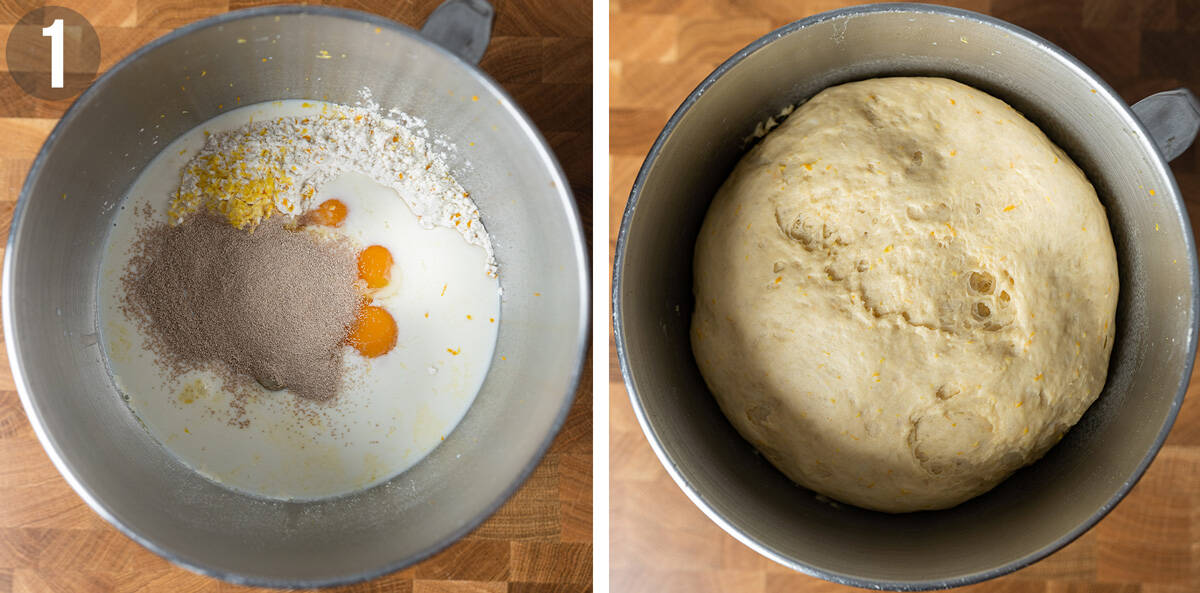
2. Second proof - Punch the dough to let the air out. Add egg yolks, sugar, and vanilla extract and mix well. While mixing, add the cubed butter bit by bit until they're all incorporated. This process could take more or less 5-10 minutes. Then knead until the dough forms a ball. This will take around 20-30 minutes. Have faith, it will form a ball. Cover the dough tightly with cling film and leave until the dough rises to double its size. This could take around 1.5-2.5 hours.
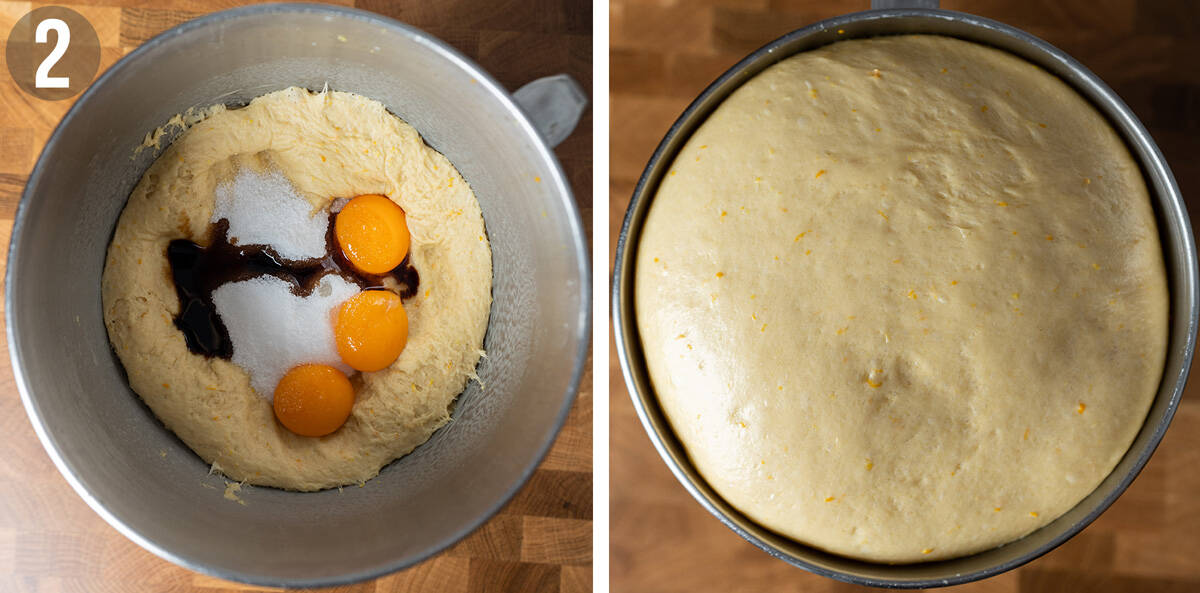
3. Third proof - Grease your working surface and your hands with some oil or butter. Pour the dough on it and stretch it into more or less a square shape. Sprinkle candied fruits and almonds on top. Squeeze the raisins to discard the orange juice and sprinkle them on the dough. Gently knead the dough to distribute them evenly. Fold it into an envelope, flip and place it inside the panettone mold, on a baking tray. Cover loosely with cling film until the top dome reaches almost 1 inch to the brim of the mold. This could take 40-80 minutes.
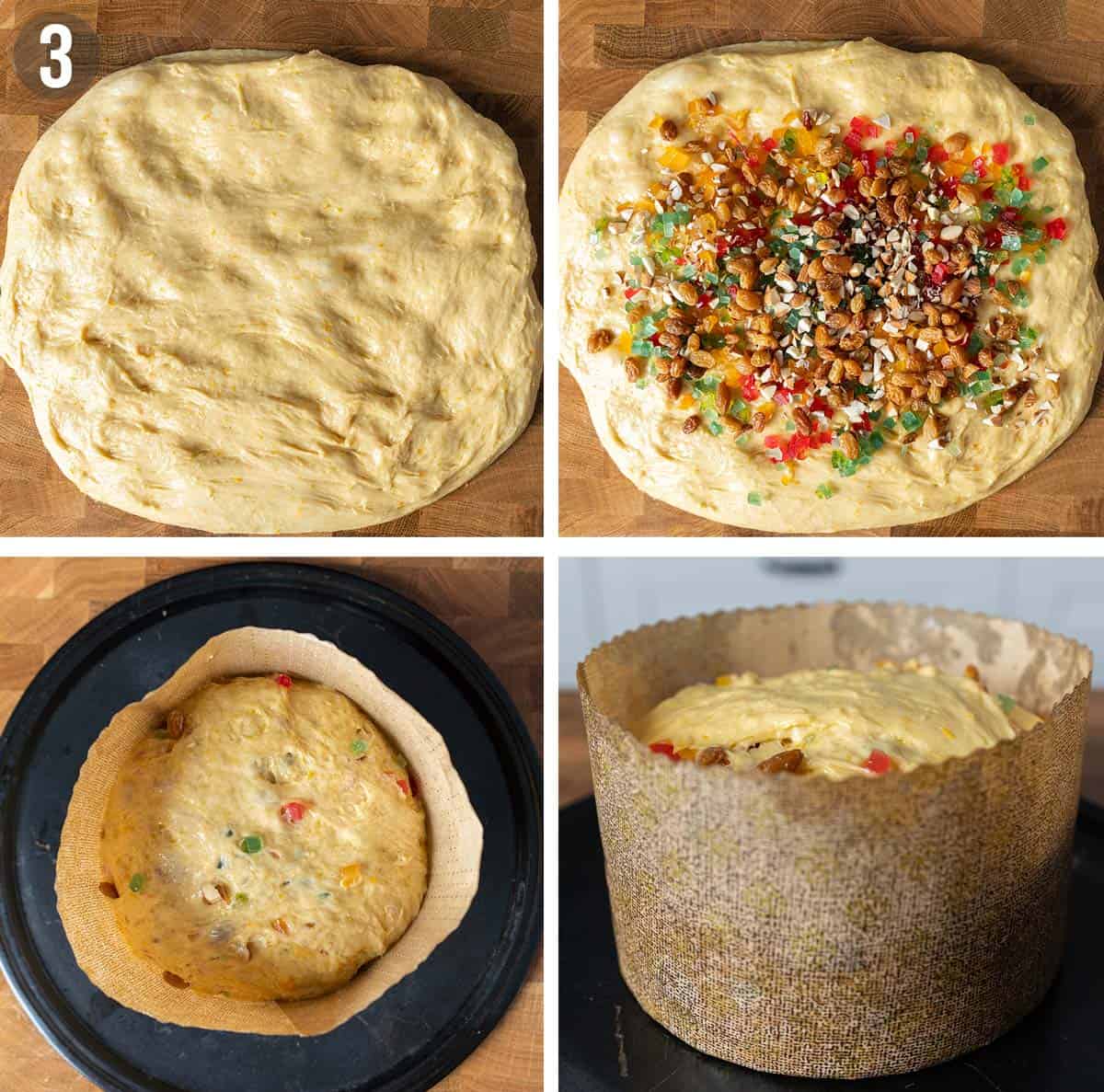
4. Bake - Gently brush the top with some egg wash. Using a sharp knife, make a shallow cross on top. Place some slices of butter in the cross. Bake in a preheated oven at 360ºF (180ºC) for 60-70 minutes, or until a skewer inserted comes out clean. Cover the panettone bread loosely with aluminum foil if the top browns too fast.
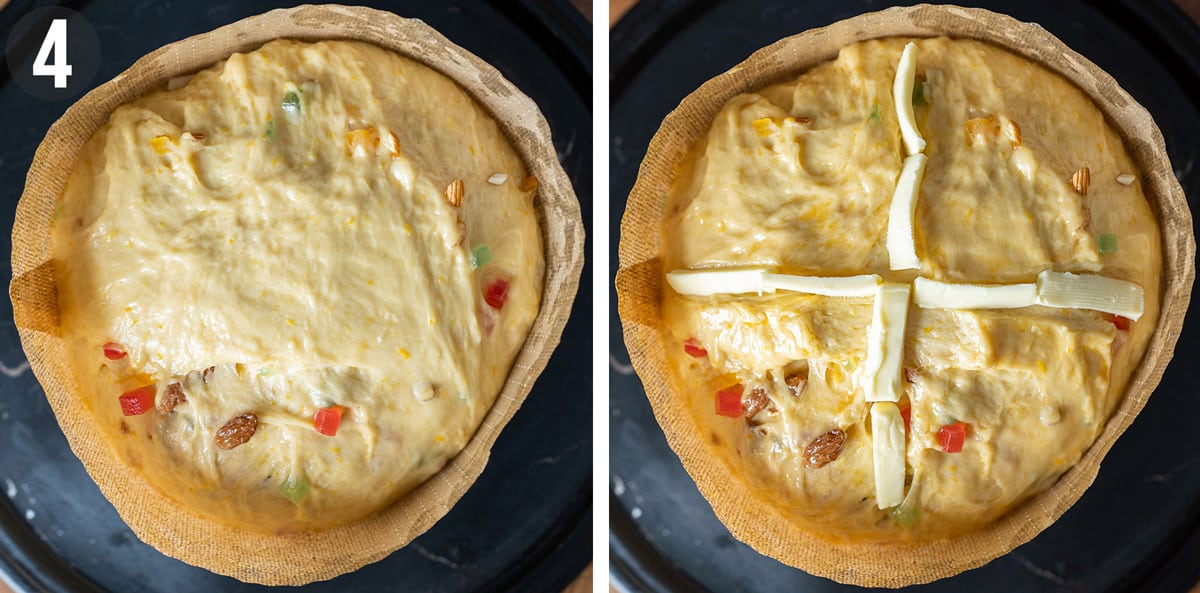
5. Flip - Once removed from the oven, immediately poke 2 metal skewers through the panettone. Gently flip it upside down and leave it to cool completely for 3-4 hours before slicing. Enjoy your panettone bread!
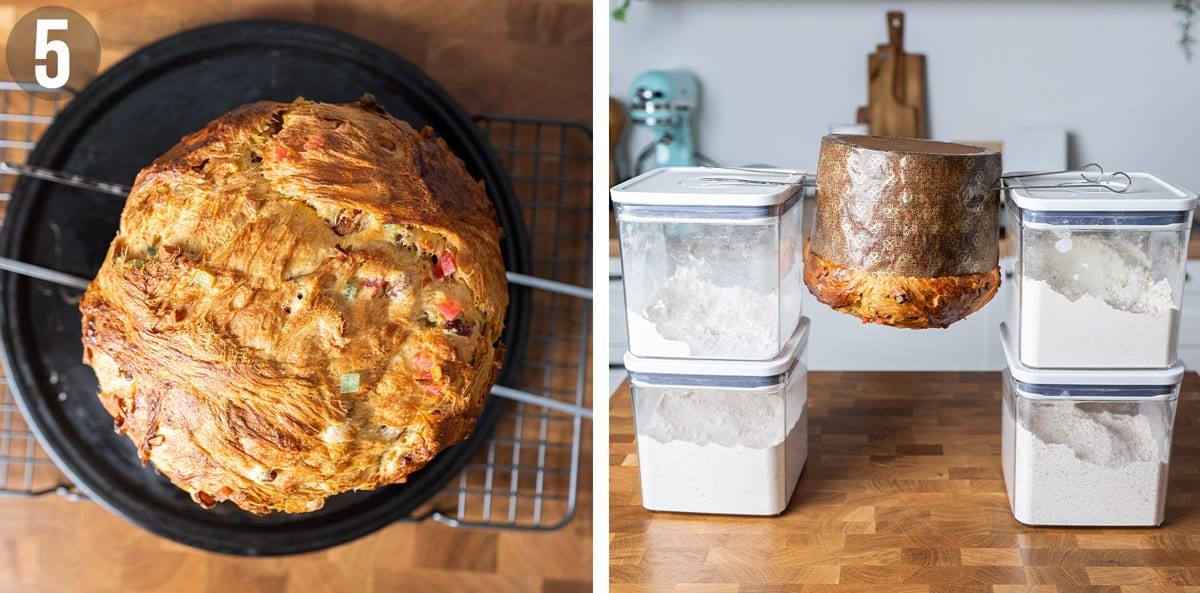
Recipe Expert Tips For Making Perfect Panettone
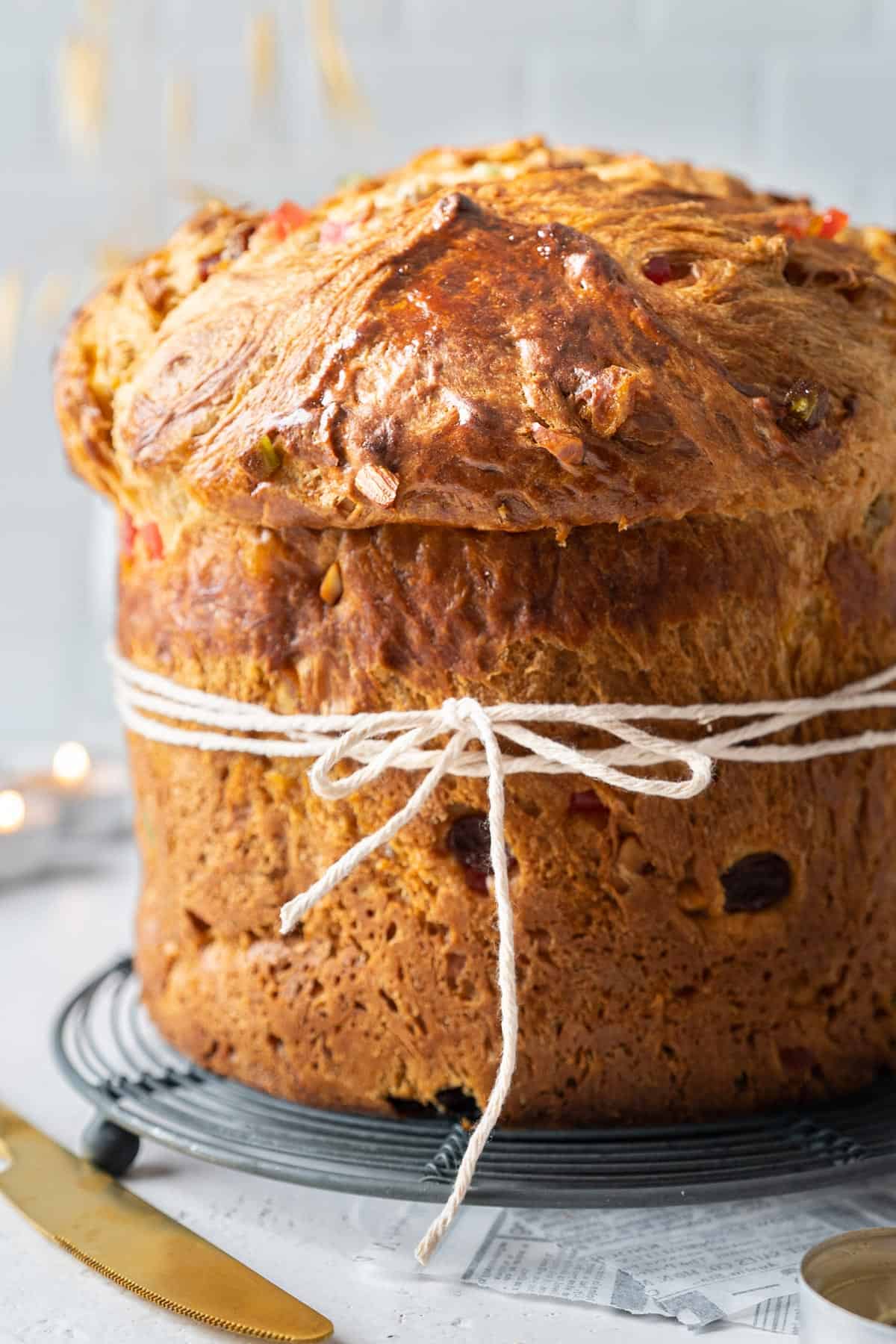
- Correct measurement - I'm a strong believer in kitchen scale. It's the only accurate way to weigh dry ingredients. In this panettone bread recipe, we don't want extra flour which usually happens when you use cup (volume) measurements. However, I do write all my recipes in both measurements, for you to choose from. Use the spoon and level method, if you're using cup measurement for this panettone bread recipe.
- Warm ambiance - If you're making this panettone bread recipe in the summer, then perfect! But if you're making this in the cold weather, then the dough will take longer to rise. Yeast needs a cozy warm ambiance to do its thing.
What I usually do is heat my oven at 75ºF (23ºC) for 2-3 minutes and then turn it off. I let the dough rise inside the oven (bowl tightly covered, placed on a wooden board). Now and then I check, and if it feels cold I heat up my oven again. I find this very helpful to create a steady continuous warm ambiance for the dough to rise beautifully. - Standing mixer - People back then made panettone bread using their own bare hands. I'd really recommend you use a standing mixer to make it easier. It's going to save time and energy (haha!). Also, the dough is very sticky, so using a standing mixer will definitely prevent you from getting panicky and overwhelmed while dealing with the dough.
- No extra flour - This dough is sticky and a bit tricky to manipulate. Do not add extra flour as it'll make the panettone dense. Oil your working surface and your hands to prevent the dough from sticking. Remember, no extra flour in this panettone bread recipe.
- Don't overproof the dough - For the final proof, the dough in the mold should not rise over the brim of the mold. The top dome of the dough should rise just until around 1 inch (2.5cm) before the brim of the mold. If you overproof the dough at this stage, your panettone bread will not rise beautifully in the oven.
- Place the mold containing the dough on a baking tray - This will make it easier to move it around to bake it later, without risking deflating the dough.
How To Prevent Panettone From Collapsing
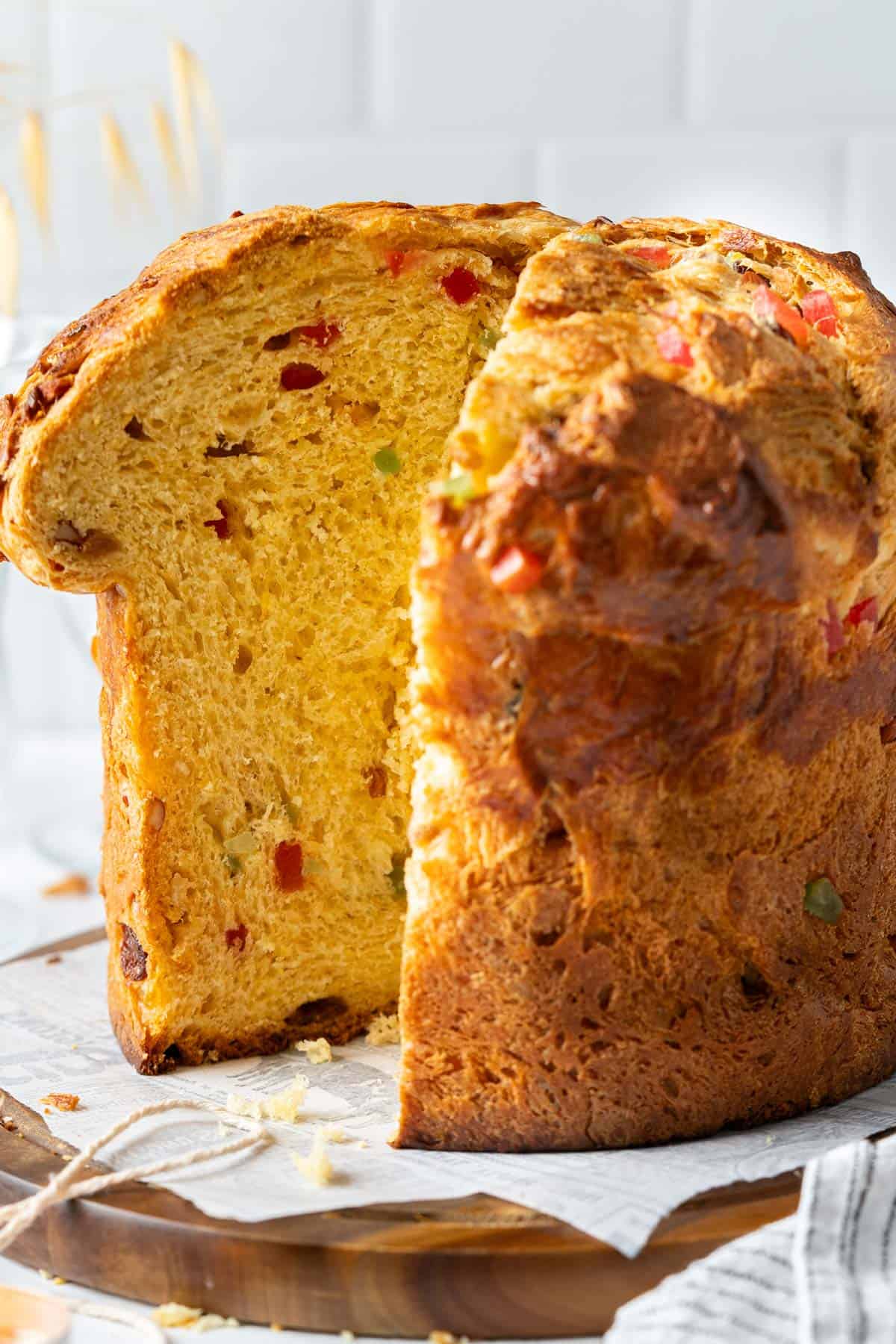
By hanging the panettone bread upside down while it cools down. I know it might sound silly but it's the most important step of all for this panettone bread recipe. You will prevent the beautiful tall dome from collapsing that'll make the panettone bread dense. Don't throw all your day's effort by skipping this last step.
What I do is insert 2 metal skewers through the panettone bread while it's still hot and carefully hang it upside down on stacks of flour containers. Usually, it takes 3-4 hours for it to cool.
How To Serve, Store, And Freeze
Serve - Best consumed on the day of baking like any other fresh homemade bread. Cut the panettone bread into tall wedges to serve with some sweet drinks, wine, hot tea, coffee, or chocolate!
Store - In an air-tight container, at room temperature. It lasts up to 5 days. The texture will start getting dry as the days pass, that's natural since we don't add any preservatives to this panettone bread recipe. No worries! Reheat it in the microwave for a few seconds and it'll be as if it just came out from the oven!
Freeze - In an air-tight container for up to 3 months. Thaw at room temperature. Remember to reheat it to bring it back to its glory!
Recipe FAQs
Nope. All-purpose flour is low in protein content and will not be able to produce tall, structured, fluffy panettone.
This is a classic panettone bread recipe that I've been making for years without changing it. Whole-wheat flours tend to absorb more liquid so adjustments and testings have to be made to the recipe, which I haven't done. So nope, use white bread flour.
Yes! It's important if you want that fluffy texture of bread in this. Since it's such a tall bread, this step also prevents it from collapsing on itself.
Nope. Cutting it while it's still warm will give the impression that the panettone bread is not fully cooked and the texture is dense. Wait until it's totally cold, it's worth it.
1) If the texture is dry on the day that you baked it, then you've overbaked it. Use a portable oven thermometer to get an accurate temperature. When baking, place it on the lowest rack so the growing top doesn't get burnt. 2) If the texture feels dry the days after, then it's natural since we don't add any preservatives to it. Simply reheat it for a few seconds in the microwave and it'll be just as if it just came out from the oven!
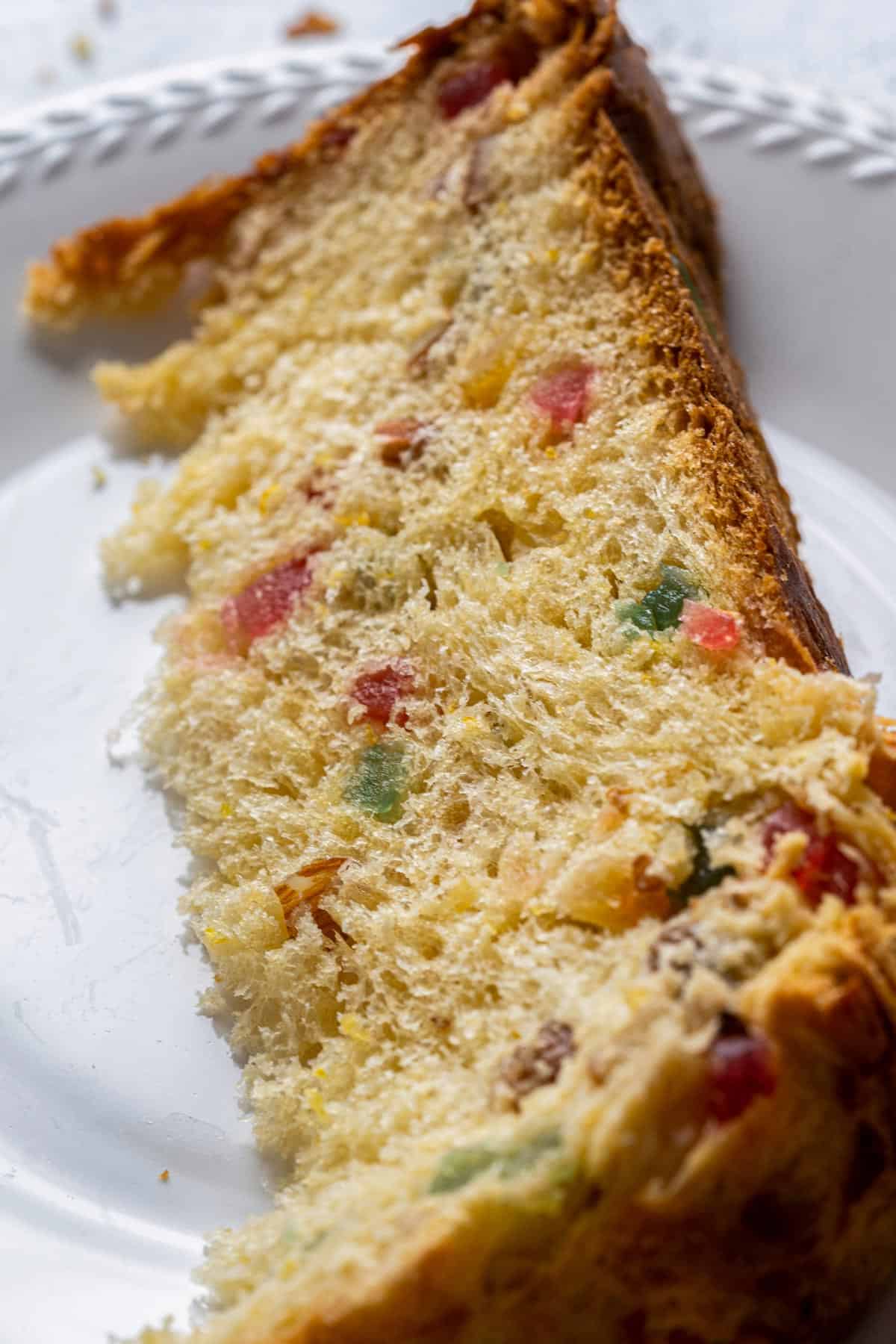
More Holidays Recipes
⭐ If you tried this Panettone Bread Recipe or any other recipe on our website, please leave a 🌟 star rating and let us know how it went in the comments below!
Watch How To Make It
📖 Recipe
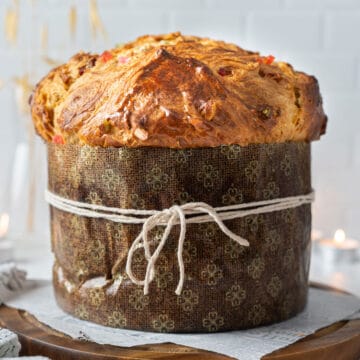
Panettone Bread Recipe
Equipment
- Panettone mold
Ingredients
Raisins
- ¼ cup raisins
- ½ cup orange juice
The first proof
- 4 ¼ cup bread flour
- 1 teaspoon granulated sugar
- 1 ½ teaspoon salt
- 1 orange, the zest
- 1 lemon, the zest
- 3 large eggs , room temperature
- ½ cup milk , warm
- 3 ½ teaspoon instant dry yeast
The second proof
- ½ cup granulated sugar
- 3 large egg yolks , room temperature
- 1 tablespoon vanilla extract
- 7 oz unsalted butter , cut into small cubes, softened
The third proof
- 7 oz assorted candied fruits , cut into small cubes
- ⅓ cup toasted almonds , chopped
Others
- 1 teaspoon oil , to grease the working surface
- 1 egg , for egg wash
Instructions
Raisins
- Soak raisins in orange juice the day before.
The first proof
- Add all ingredients for the first proof in a standing mixer bowl. Take ¼ cup of the orange juice from soaking the raisins and add it in. Mix well and then knead for 10 minutes. Cover the bowl tightly with cling film and leave until the dough rises to double its size. This could take around 1-2 hours.
- Cover the bowl tightly with cling film. Let the dough rise to double its size.
The second proof
- Punch the dough to let the air out. Add egg yolks, sugar, and vanilla extract and mix well. While mixing, add the cubed butter bit by bit until they're all incorporated. This process could take more or less 5-10 minutes, don't rush it.
- Then knead until the dough forms a ball. This will take around 20-30 minutes. The dough will be very soft and sticky at first, but it will form a soft ball at the end. Trust the process. Cover the dough tightly with cling film and leave until the dough rises to double its size. This could take around 1.5-2.5 hours.
- Cover the bowl tightly with cling film and let the dough rise to double its size.
The third proof
- Grease your working surface and your hands with some oil or butter. Pour the dough on it and stretch it into more or less a square shape.
- Sprinkle candied fruits and almonds on top. Squeeze the raisins to discard the orange juice and sprinkle them on the dough. Gently knead the dough to distribute them evenly.
- Fold it into an envelope, flip it, and place it inside the panettone mold of 2 lb (1 kg), on a tray. The tray will make it easier to move the mold without risking deflating the dough.
- Cover it loosely with a cling film and let the dough rise until the top dome reaches almost 1 inch from the brim of the mold. Don't over-rise it. This could take 40-80 minutes.
Bake
- Gently brush the top with some egg wash. Using a sharp knife, make a shallow cross on top and place some butter on the cross.
- Bake at 360ºF or 180ºC, in a preheated oven with the fan turned off, on the lowest rack, for 60-70 minutes or until a skewer inserted in the centre comes out clean.
Flip upside down
- Once removed from the oven, immediately insert 2 metal skewers through the panettone. Gently flip it upside down and hang it until it cools completely for 3-4 hours before slicing. Enjoy!
Notes
- I highly recommend using a kitchen scale for this recipe as it's more precise.
- Use a portable oven thermometer to get a precise oven temperature (I use it all the time).
- The dough will be soft and sticky, do not be tempted to add more flour.
- Do not let the dough rise too much in the third proof stage. The over-risen dough will result in the dough overflowing the mold when you bake it.
- Cover the top loosely with aluminum foil if the panettone browns too fast.
- Never slice a panettone (or any bread!) when it's still hot/warm.
Nutrition Facts
Originally published on Nov 23, 2017. Updated with improved text and pictures on Nov 28, 2023.






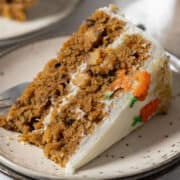


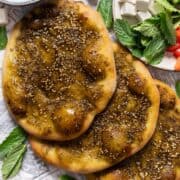
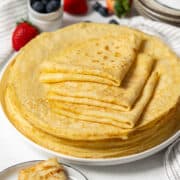
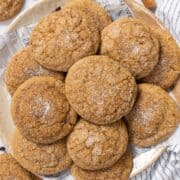

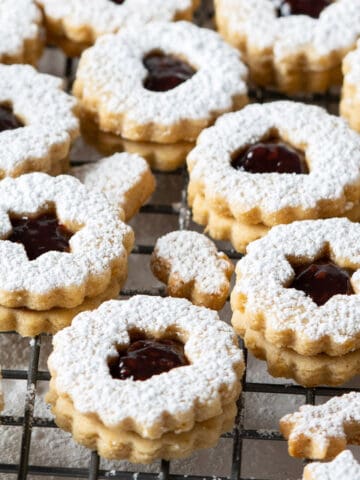
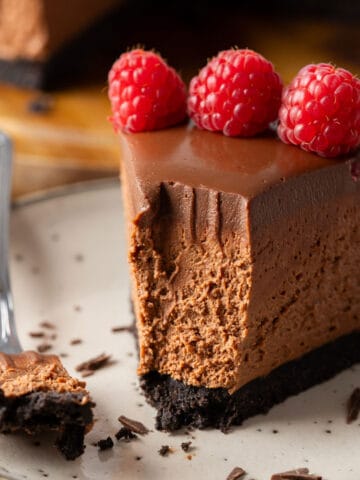
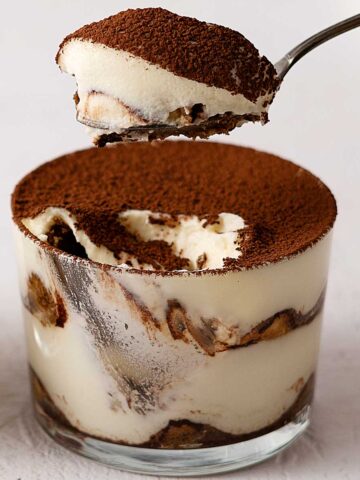
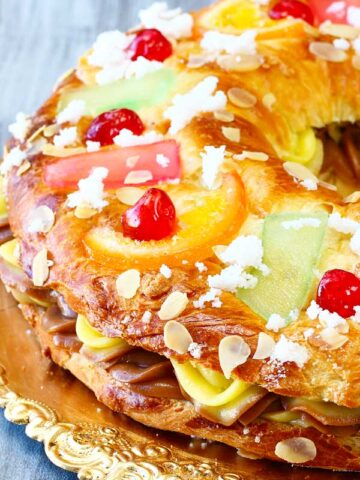

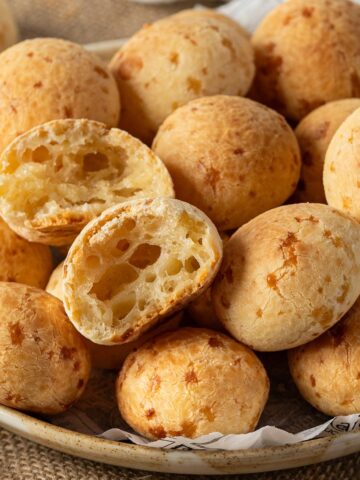

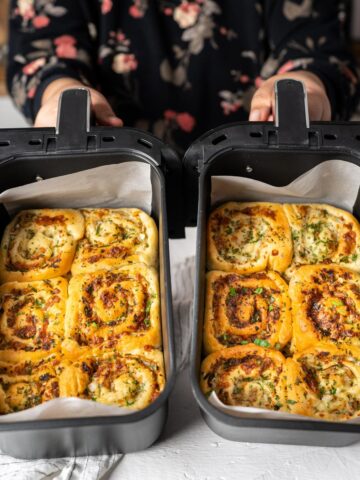
Brülisauer Dalida says
Hello,
I made this recipe last week and really enjoyed the result, nevertheless I feel it could be a bit sweeter. Is it possible to increase the amount the sugar? Thanks
Bea & Marco says
Hi! We're happy to hear that you really liked it. If you prefer it sweeter, yes, add bit more sugar but not too much as it might effect the grow of the dough. Hope it helps!
Natalia says
Unfortunately in my country, they don't sell panettone cases. Can I use a cake tin and parchment paper instead? I am not sure if it can be hung upside down as a homemade case lacks the structure of a shop bought one. Thanks
Bea & Marco says
Hi Natalia, yes you can use a cake tin and parchment paper, and yes you are correct that it probably wont have the strength to be upside down. Maybe you want to try my mini panettone recipe that doesn't require to be hang upside down. You can swap the choc chips for candied fruits. Here's the link to the recipe https://www.elmundoeats.com/mini-chocolate-panettone/
Matt says
Superb! Very detailed video and writing and I thank you both. I have tried several other recipes before but none were successful.
WIth your detailed recipe finally I managed to make an outstanding panetone.
great job to you both.
Bea & Marco says
I'm glad that this worked great for you, Matt! I make this every year, we just love it so much. Thanks for giving it a try!
Cathy says
Hello, your recipe looks wonderful! Can you adapt it using a stiff sour dough starter? If so, can you provide the recipe? What are the pros and cons to using yeast, if any? Thank you!!
Bea & Marco says
Hi Cathy! I haven't worked with sourdough starter before so I can't really say if it's suitable with my recipe or how to do it, so sorry! Personally for me, using instant yeast is easier (coming from a non-sourdough baker myself 😂) since it's easier to get/buy and keep (no attention needed). Hope this helps you in any way!
Joseph Basile says
I forgot to give the recipe 5 stars in my previous message.
Bea & Marco says
Thank you, Joseph!
Joseph Basile says
The recipe is fine except for the fact that the finished panettone is very dark. Looks almost burnt. I have springtime panettone pan that I used for the first time today. It is impossible to turn the panettone upside down after baking without it spring out of the pan. Any suggestions?
Bea & Marco says
Hi Joseph! Perhaps your oven temperature was too high (I suggest using a portable oven temperature to get the accurate temperature) or the panettone was placed too close to the upper heat. It's a bit difficult with the pan, perhaps you could remove the panettone from it and then flip it upside down? I also have a springform panettone pan but then never use it because of this problem. Hope it helps in any way!
Monette says
done it perfect. how can I attach the photo of my panettone?
Bea & Marco says
Awesome! You can send me the photo on our Instagram (elmundoeats), I'd love to see it!
Doreen Goh says
Hu Bea, chance upon your recipe 2yr back n have been baking this yearly for Xmas.. Just checking, any idea max how long we can keep tis bread?
Rosie says
I made this last Christmas during quarantine and it was delicious. Very easy to follow steps, but you do need patience. It's a process that takes some time. I like that I know what's in my Panettone, most store bought last for many weeks, is that even safe??
Bea says
Happy to know that you loved it, Rosie. I make this every year, we totally loved it. Store bought ones last months 😁 and as any other products, they're with preservatives etc and the ingredient are like a mile-list, compared to homemade ones. Thanks for your feedback, Rosie!
Raed says
I watched a lot of panettone recipes but this is the best and easy to follow your steps.
I’ll try it very soon and hopefully ot will work.
Thanks for your clear vedio and clear instructions.
Bea says
Yes, I hope you make it. Everybody who've tried it just loved it. Thanks Raed!
Doreen Goh says
Love this sweet bread.. First time baked during last Xmas as couldn't buy any freshly bake in my area (SG) (too last min craving ..😅) thus searching around for foolproof recipe... Overall love how the bread had turn up to be ...immediately fall in 💖with this sweet bread... Making this again now for our CNY.. Tweeted recipe abit to incorp with mandarin oranges...
Bea says
Awesome, I'm happy that you gave it a try and liked it Doreen! Yes, adjust it to your likings, no problem at all. I make this every year for Christmas. Thanks for your feedback! ❤️
Nasser says
Hi dear El Mundo
Do you have classic panettone recipe in which sourdough used for starter?
Bea says
Hi Nasser! Unfortunately no, I don't have sourdough recipes (as for now). Sorry though! Many have made this panettone and loved it, perhaps you could give it a try. Thank you!
Nasser says
👍👌🌹🙏🏻🎂
Cobbgirl says
This recipe is absolutely amazing. Follow every instruction, definitely read the tips and tricks section
They make a difference.
If you scoop the flour like normal like did in the first proof, and the dough is exceedingly dry, just add a drop more of milk or OJ and it turned out great still.
Bea & Marco says
Happy to know it worked out great for you 🙂
N. Zamaand says
Hi thanks a lot for ur nice and complet recipe👍🙏🏻
. I baked it and the result was amazing. ❤🌹🎄
Bea says
I'm glad you enjoyed it 🙂
Monika says
can you make the last rising over night?
Bea says
Honestly I haven't tried it, so I can't really say. Sorry!
Rosa says
Can I make this but use chocolate chips instead of fruit? What would I have to change? thanks 🙂
Bea says
Yes, just use the same amount of chocolate chips instead of candied fruit. Hope it helps!
Randa says
My dear; I followed exactly the steps mentioned, but it ended up like a cake,
Can you advise , what I did wrong?
Bea says
Sorry to hear that Randa! I think it has to do with your yeast, maybe it wasn't activated properly or has expired. Hope it helps in a way.
Jaki says
Amazing recipe, my first time ever panettone was delicious.
It looked a little weird on top because I could not get the cut to take before baking, I think the dough was too soft and so the egg wash and butter ran off and the top only browned on the edges plus the shape was strange .
But the taste was amazing
What speed do you knead at on the stand mixer , I wondered if that was the problem with my dough or if I let it rise too much on the second rising?
Thank you for the recipe and the video and Felice Navidad
Bea says
Hi Jaki! I use speed 1 for mixing the ingredients and once everything comes together I change to speed 2 (the max kneading speed advised for my stand mixer). Over proofing a dough will not make it rise beautifully when it's baked in the oven. In panettone it's difficult to restrain ourselves from leaving the dough to proof so high since we want the final result that way (I learnt from the mistakes I made 😀 ). I'm happy that you gave this recipe a go. Thank you Jakie and feliz navidad to you!
Linda says
I am not sure where my questions went for making this recipe. I hope they’re not in your spam. I am writing to you from Arizona USA
Bea says
Hi Linda! I've just answered all your questions, hope you got them 🙂
Linda says
I have another question please. I thought the panettone lasted two weeks if kept in plastic bag, like the store bought ones
Bea says
No they don't because homemade ones are not with preservatives and etc. Hope it helps.
Linda says
Did you use active dry or instant yeast
Bea says
I use instant yeast.
Michelle says
Hi! My Panettone mould size is 17 cm (top diameter) / 15cm (bottom diameter) x 9.5 cm (height). Is it big enough to fit this dough in?
Bea says
Mine is 17 (diameter) x11 (height) cm. Yours is a tad smaller so maybe it could work. Or to be safer (since the dough rises a lot), bake it in 2 moulds. Hope it helps.
Michelle says
Thank you very much for the response! One more question: Did you use dark rum to soak the raisins?
raunak kothari says
Do I need a stand mixer to knead this dough or can it be done by hand as well without it being too frustratingly sticky ?
Bea says
Standing mixer is the best for the nature of the dough. It's doable by hands but with more efforts and time.
Suat says
I like to try your recipe. Panettone makes nice Christmas gift but will need to bake soon. How long can we store the baked panettone and how best to do it?
Bea says
Panettone can lasts up to 5 days if stored correctly (air tight container, room temp) but it's always the best on the day of. It tends to get dry after a day or two. Hope it helps.
Gina says
I have a question really. If I wanted to make Panettone in 3.1/4 paper molds what does that do to the bake time? I've looked at many recipes and the texture of your bread is the best.
Bea says
Hi Gina! I don't really understand your question, sorry! But if you're thinking of making smaller sized panettone, perhaps you could see my mini panettone recipe here. Hope it helps and let me know what you think!
Susan Foong says
I made last year just before Christmas. It’s very lovely and I am planning to make again soon. 😛😛
Bea says
Yeay! Happy that you gave it a try, thank you Susan. I'm trying to squeeze in time to make it for us also 😁.
Pedro says
Hi. I am looking forward to making this Panettoni in the next few days, It looks amazing. One question Is it posible to use rum and orange juice if I reduce the amount of milk?
Bea says
Hi! I wouldn't recommend you reduce the milk though as its protein and fat content enriches the bread and makes the texture softer. Rum and orange juice unfortunately don't have either. Hope it helps.
Chua L S says
Hi
Your recipe looks great. Just to clarify, your tsp mentioned in your recipe refers to teaspoon (5g) or tablespoon (15g).
Thanks.
Chua
Bea says
Hi Chua! My 1 tsp = 5 ml, 1 tbsp = 15 ml. Hope it helps 🙂
Vicky. says
Hi . Gonna try it. Hope it will come out perfect. It's the first time I'm doing panettone. Your recipes have helped me a lot a lot in baking. thanks for teaching us. Wish you God's Blessings
Bea says
I'm happy that you're enjoying my recipes, Vicky. Have fun with the panettone. I also have a small (mini) version of it here, if you'd like to start with that. Enjoy!
Chua L S says
Hi
I was reading your wonderful recipe and thought of trying out.
One question. If I do not have rum, what is the substitute for this?
Thanks.
Chua
Bea says
You can just use orange juice, no problem at all. Hope you'll give it a try, I make it every year 🙂 Thanks Chua!
Sobia Malik says
Hello
Really like your recipe just want to ask do you a gluten free pentonne recipe because am allergic to wheat thanks
Bea says
Hi Sobia, sorry I don’t have one.
Anna says
Hei, can I use chocolate chips isted off dry fruit? 😁
Bea says
Hi Anna! Maybe you want to check my mini panettone recipe. I used choc chips in that one instead of the dried fruit.
Renee says
Hello, can you give an estimate of how long each rise might take? One or two hours? I understand the time will depend on the tempature if the room and other factors, but I’m jut trying to estimate the time needed for the entire process. Thank you! I am looking forward to making this holiday season. I appreciate the video to go with the recipe.
Bea says
Hi Renee! I would say free your whole day for this, just to be safe. Each rise would take around 2 hours, more or less. There's a lot of waiting going on 😀 but it's going to be worth it. Hope you like it, I make this every year with my mother-in-law.
Renee says
Thanks for the reply. I assumed about 2 hrs each rise. I’m used to the waiting, I’m an avid bread maker. I’ll be sure to let you know how it turns out! Thanks again!
Bea says
Oh that's awesome! Yes do let me know 🙂
Sue says
Hi Bea,
Thanks for the recipe. I am going to try this for Christmas gift. I have a few questions:
- Does the “1/2 cup Ron’ refers to Rum.
- To make a mini version of this, how do I calculate the amount of dough for the mini panettone mound ; I bought the 110 mm X 85mm (H) paper mound.
- if I make the non alcoholic version, should I increase the liquid?
Thanks so much.
Cheers
Sue
Bea says
Hi Sue! Yes it refers to rum. I have a recipe for mini panettone, do check it out for references. Thanks!
Peter fraone says
Hi what cooking temperature would you recommend for a fan assisted oven?
Bea says
Hi Peter. I would not recommend using fan forced when baking this since I feel it tends to make the bread a bit dry (at least for me). If you really have to use it, I would say reduce the temperature by 20º. Hope it helps.
melly says
Outstanding result, I made this recipe. very worth the time. thank you for sharing this.
Umen says
Since I made ur mini chocolate panettone I wanted to make ur normal size panettone also. I followed everything and it came out perfect. I'm proud of myself. Thanks for sharing Bea!!
Bea says
Hi Umen! Hey I'm happy to see that you've tried this panettone also. It's not difficult as people might think. It only needs more time than mini panettone or other typical breads. Thanks for the love Umen!